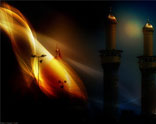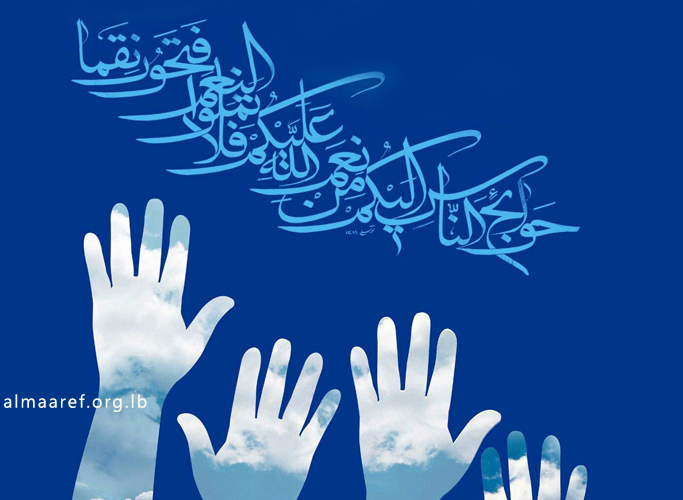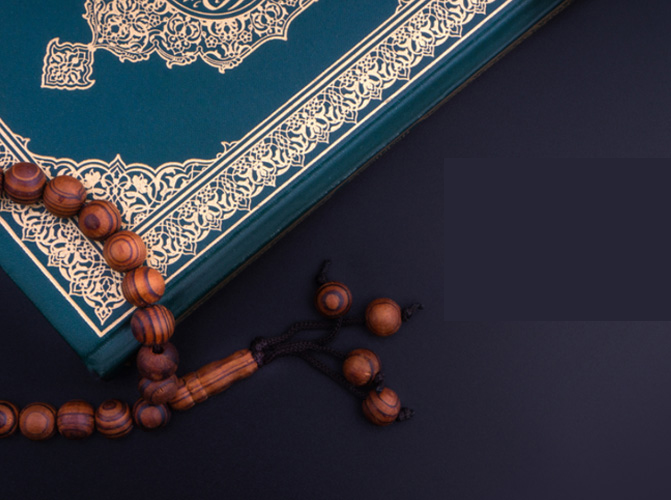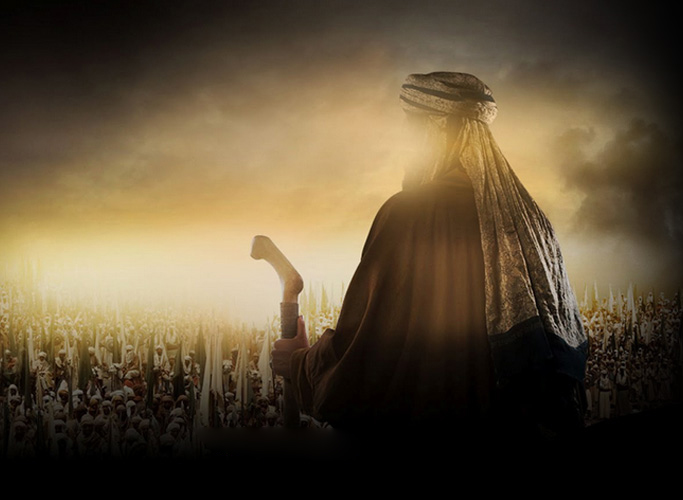Imamate and Shiites
Imamate & Caliphate
Imams to Entire Humanity
Islam, the all-Wise Qur’an, Prophet Muhammad, May Allah’s Peace and Blessings be upon him and his Household, are to all mankind; so are the Imams. Verse number 28 of Surat Saba’ illustrates this sense:
﴾We did not send you except as a bearer of good news and warner to all mankind﴿
None of the Imams had exclusively addressed a group of people or even the elite. The variety in their stylistic oral discourse, especially of Imam as-Sajjad, is strong evidence. Sayyed Ali al-Khamenei says:
“What we are going to investigate right now is the words of Imam as-Sajad published in the book of ‘Tohaf al-Okoul’ [literally translated as the Treasures of Minds]. His words reflect the variety in the stylistics he is adapting as well as the different categories of the audience he is addressing. You can notice that in the speech that he is addressing the average people, he is absolutely excluding his intimate, special or top companions, so he starts as saying: ‘Oh people, be pious of Allah; know that you are all returning to Him’1. And in order to elevate people from ignorance toward Islam’s knowledge, he draws their attention toward the necessity of the real comprehension of Islam and its principles.”
Weeping Aggrieved Imams
Is weeping a signal of weakness in a human being? Are Shiites then weak for they cry the expiration lived by their Imams?!!! Are they weak for they cry the maltreatment practiced over Imams, specifically over the Lord of Martyrs, Imam al-Hussein, who martyred along with his companions in Karbala?! Or is weeping a psychological breakdown?
Weeping may be interpreted accordingly with the different stimuli that agitate it. As a result, it could be a signal of weakness. But it could also be a signal of strength. Nevertheless, the act of weeping that creates internal power is the one recommended by Ahlu al-Bayt, Peace be upon all of them.
The leader Sayyed Ali al-Khamenei says:
“Imam Muhammad al-Baqir, Peace be upon him, had maintained his jihad through launching the assembly of solace to Imam Hussein in Mina2; moreover, he recommended that people launch a similar assembly in the same location to him, too, after his departure of this life; he also expressed his desire of having this assembly lasting for about ten years. And he had set for this purpose a budget of about eight-hundred Dirham to enable people to implement his will.
‘Mourners will have been mourning for me for ten years in Mina’ Imam al-Baqir expresses.
Mina has a distinguishing criterion for the considerable large time pilgrims spend over there; while being in Mecca, pilgrims are usually over busy and distributed; whereas their stand at the plain of Arafat lasts only between the early morning and the mid of the day; nonetheless, they pass only for few hours through the Sacred ‘Mish’ar’ before going to Mina. Therefore, their stable stay in Mina for three consecutive nights facilitates their gathering at once; add to that their arrival from worldwide makes their meeting perfect to establish this great event of solace.
This annual assembly had become Ahlu al-Bayt’s platform. There, Ahlu al-Bayt’s tragedies were well expressed throughout the very simple and available means of communications at that time. No radio, TV, newspaper or any of today’s media, a worldwide assembly, where the tragedies of Ahlu al-Byat were being mourned for, would definitely raise big question marks in the heads of the arrivals; for none may cry for another ordinary person after years of his death. The wisdom of the order of weeping is clearly noticed when questions like: Has Imam Hussein been aggrieved? Has he been murdered? Who has tyrannized him? These questions would definitely be raised. It is then an accurate and a jihad and well-planned movement!
This reflects the continuity of the jihad of Imam al-Baqir, Peace be upon him. Why did he want people to launch the assembly of solace to himself? His biography reflects his insistence on the act of weeping. This is reflected also in narrations reporting Ahlu al-Bayt. Correct and reliable narrations insist on the merits and the importance of the mourning for Karbala’s tragedy more than any other incidents.
It happened that when Imam al-Ridha was about to depart this life, he called his family for an assembly to mourn his imminent departure. This incident has its own political implications that are heavily related to the period prior to the Imams’ traveling and martyrdom.”
No Despair among Imams’ Followers
The act of weeping recommended by Ahlu al-Bayt, Peace be upon all of them, is the one that creates strength, produces jihad, reflects the sorrow for the oppression practiced against Imam al-Hussein; it is the one that builds hopeful and tranquil feelings toward the more brilliant future, which will be governed by the original Islam of Prophet Muhammad, Imam Ali and Ahlu al-Bayt, May Allah’s Peace and Blessings be upon all of them; thus, their recommended weeping has never ever been the one that drives to any psychological collapse or despair!
The leader Sayyed Ali al-Khamenei has a lot to say about the role of Ahlu al-Bayt in strengthening the hearts of their followers and having these hearts fully hopeful toward the future. He says:
“Imam al-Baqir, Peace be upon him, had avoided any direct or heated confrontation against the ruling system; yet kept clarifying the issue of Imamate for his intimate companions, worked on enlarging Shiites great hope in establishing the Divine political system in the brilliant future. This is one of his empowering methods. It comes as a part of his overall movement.
One of Imam al-Baqir companions named ‘al-Hakam Bin Ay-yina’ narrates the following:
‘One day I was at Imam al-Baqir’s house. It was over crowded with his family when an aged man came leaning on his wooden stick, stood on the door and greeted Imam al-Baqir as saying: “Allah’s Peace, Mercy and Blessings be upon you, son of Prophet Muhammad.”
“Imam greeted the man back: “Allah’s Peace, Mercy and Blessings be upon you, too.”
“Second, the aged headed toward the Imam's family and greeted them, as well: “Allah’s Peace, Mercy and Blessings be upon you.”
The man paused in silence until they greeted him back.
Next, he headed toward Imam al-Baqir, Peace be upon him, and requested: Oh, son of Prophet Muhammad, May my spirit be redeemed before you! Would you please bring my seat just near to you? By Allah, I love you, and I love those who love you! By Allah, I love you not because of any sort of greed in this present life. Moreover, I hate your enemy. I repent myself of your enemy. By Allah, I don’t hate your enemy or repent of him because of any personal conflict between him and me; but rather I, by Allah, legitimate what is lawful according to you, and I prohibit what is unlawful according to you. And I wait for your Order3. So would please have me seated next to you?
After that, Imam al-Baqir, Peace be upon him, said: “Come to me, come to me.” And he brought him to his side. And he added: “Oh, aged man, once, a man came to my father Ali Bin al-Hussein, Peace be upon both of them, asking him what you’ve already asked me; my father told him that if you die, then you will meet Prophet Muhammad, Ali, al-Hassan, al-Hussein and Ali Bin al-Hussein. So your heart will be pleased and tranquil; you will be welcomed by the Spirit, the two noble angel writers and sweet basils4. If you stay alive, you will see what pleases you and accompany us to the higher places in heaven.”
The man got astonished from the good news reported and asked: “How?”
Imam al-Baqir, Peace be upon him, repeated once again what he has already said. The man stated: “Allah is Great! Oh, Abu Ja’far, if I die I meet Prophet Muhammad, Ali, al-Hassan, al-Hussein and Ali Bin al-Hussein, and I will be pleased, tranquil and welcomed by the Spirit, the two noble angel writers and sweet basils! And if I live, I will see what pleases me and accompany you! After that he started crying and fell to the floor. The Imam’s relatives started crying with him, too, until he raised his head and asked Imam to stretch his honorable hand, and he placed it against his eyes, cheeks and blossom. Finally, he stood and made his farewell while Imam was stating: “Should any like to look at Heaven, let him look at this man.”5
A statement like this will at least empower hope inside people who are living under oppression. This hope motivates them toward the aim of establishing the just Islamic system.”
Emotions Insufficient
Being emotionally attached to Ahlu al-Bayt, Peace be upon all of them, is greatly recommended by the Holy Qur’an as in verse 23 of Surah al-Shura (Counsel):
﴾Say, ‘I do not ask you any reward for it except love of [my] relatives.﴿
However, the Qur’an itself clarifies the meaning of ‘love’ as it’s linked to the act of following and working. This is found in verse 31 of Surah Al-i Imran (Family of Imran)
﴾Say, ‘If you love Allah, then follow me; Allah will love you…﴿
Love without the very act of obeying is meaningless. The expression of love toward Ahlu al-Bayt, Peace be upon all of them.
Sayyed Ali Khamenei says:
“Imam al-Sadiq has portrayed the position and the prominent role of the fourth Imam, Ali Bin al-Hussein, Peace be upon all of them, in the following statement:
‘After Imam Hussein, people became apostatized except three men named respectively as ‘Abu Khalid al-Kabili,’ ‘Yehya Bin Ommu al-Tawil,’ and ‘Jibril Bin Mot’am, ‘Yehya Bin Ommu al-Tawil’ used to enter the mosque of Rasul Allah [Allah’s Apostle], May Allah’s Peace be upon him and his Household, and alarming people there by the following verse:
﴾We disavow you, and between you and us there has appeared enmity and hate for ever﴿6
These are the words of Prophet Abraham as he was confronting his opponents; Allah quotes him in this mentioned verse.
Sayyid Ali al-Khamenei explains:
“This report portrays the Islamic society’s general psychological breakdown following the martyrdom of Imam Hussein; this breakdown affected Shiites communities and individuals that had been satisfied by their emotional ties to Ahlu al-Bayt, but practically they stayed attached to present life’ matters and glory. People of this sort are always massive in number.
At that time, during the era of Imam Ali Bin al-Hussein, only three, out of thousands who pretended to be Shiites, remained emotionally and practically attached to Ahlu al-Bayt; these three men didn’t get paralyzed by the ‘Amawi ruler's terror or arrogance. Besides that, their seeking of safety did not prevent them from staying fully alerted and determined in their resistance. They weren't carried by any dominating stream. ‘Yehya Bin Ommu al-Tawil’ managed to face people in the middle of the mosque in the Madina al-Munawarah. And when he restated the words of Prophet Abraham, he wanted to declare it obviously that there is a complete separation between the front of the real followers of Ahlu al-Bayt’s mission and the other front of fake hope and materialistic world.
This kind of separation exists as long as Allah’s missions are effectively taking place.
Imam al-Sadid, Peace be upon him, has expressed about the separation of the two fronts as saying:
‘Who isn’t with us is against us.’
That means the one who is not in the front of monotheism is consequently in the front of the arrogant and that in the calculations of belonging and following, nothing exists in between, and neutrality becomes always meaningless.
‘Yehya Bin Ommu al-Tawil’ is a real Muslim and supporter of Ahlu al-Bayt. His voice separates between those whose thought and practice reflect their commitment to Ahlu al-Bayt’s mission and those whose emotional ties are satisfactory to them, yet their interests remain more primary.
Sayyid Ali al-Khamenei says:
“Today, we understand the guardianship of Ahlu al-Bayt in its true and realistic meaning. Previously and at the time of Imam Ali Bin al-Hussein, Peace be upon both of them, people used to be simply emotional in their relation with Ahlu al-Bayt. That means they used to interpret the calls of being under the guardianship of Imam Ja’far al-Sadiq only as being calls to ‘love’ him. Is that reasonable? Speaking at a social level, showing ‘love’ to an individual has never been a matter or a concern. In addition to that, if guardianship were to be interpreted according to the terms of ‘love’, then nothing would help here because Imam Ali Bin al-Hussein continues clarifying his report about the overall situation of his time, and after the martyrdom of his father Imam al-Hussein:
‘A group has followed and answered; another disavowed and denied.’
But who would deny and refute the love of Ahlu al-Bayt!!! Next, Imam Ali Bin al-Hussein continues reporting:
‘Still another that got afraid and paralyzed.’
Then if guardianship were to be interpreted as being the expression of ‘love’ then it would not be convenient with the feeling of being afraid or paralyzed. This indicates that guardianship of Ahlu al-Bayt has got other than the meaning of love. It actually implies the Divine government”.
* Imams’ Broad Biographies, chapter 3. Edited by: Nūn for translation and writing center. Published: June 2010. www.almaaref.org.
1- ‘Tohaf al-Okoul’ i.e. ‘the Treasures of Minds’, page 249
2- Mina is an area where pilgrims spend three night stays as a part of Hajj rituals.
3- The Order of Allah, i.e. the reappearance of Imam al-Mahdi, May Allah expedite his honorable arrival.
4- Sweet Basil is a plant used specially for dead Muslims; the two angel writers: are the one who records the good deeds of a man and other who records his wrong deeds. In the present life they accompany a person; the one responsible for the good deeds is located on the right side of a person, while the other is on his left.
5- Al-Kafi, Volume 8, pages 75-77
6- Verse number 4 of Surat al-Mumtahanah; Bihar al-Anwar, volume 46, page 144, pu




















